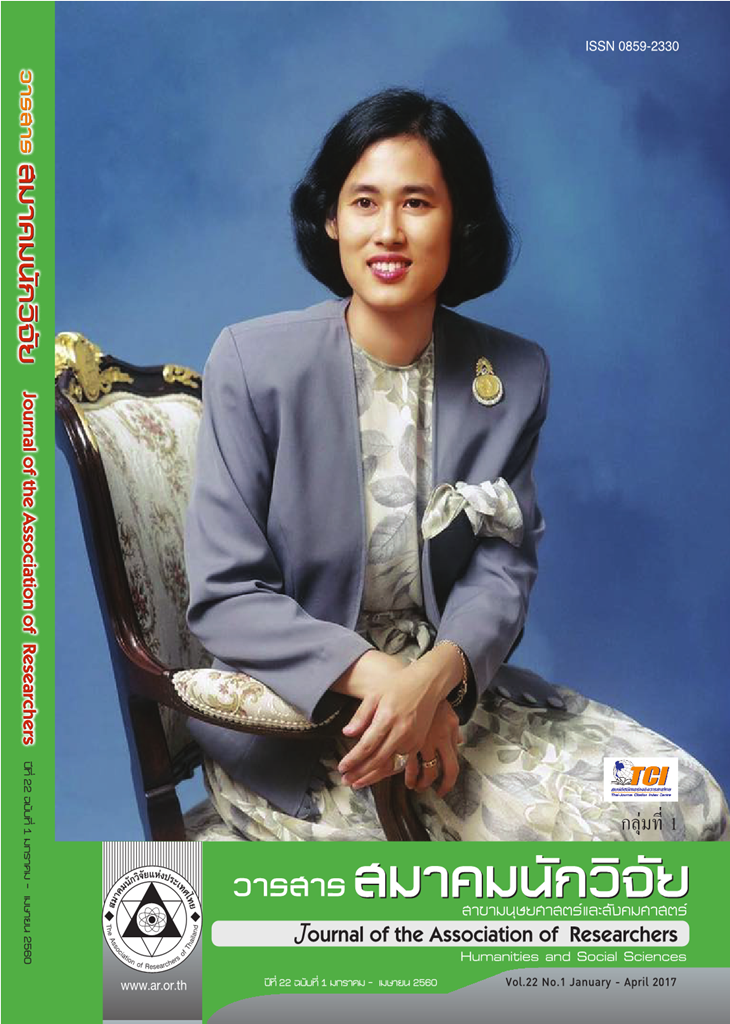Transformational Leadership, Knowledge Management, Learning Organization and Innovative Work Behavior in Secondary Education of School Office 1,2,3,4, and 6
Main Article Content
Abstract
The purposes of this research were to study levels of transformational leadership, knowledge management, learning organization and innovative work behavior, to study relationship among transformational leadership, knowledge management, learning organization and innovative behavior and to study the totally influences of transformational leadership and knowledge management on learning organization and 4) to study totally influences of transformational leadership direct and indirect on knowledge management, learning organization and innovative work behavior in Secondary Education of School Office 1,2,3,4,6. The results were as follows : The level of transformational leadership, knowledge management, learning organization and innovative work behavior were high every factors . While result of correlation analysis were found between transformational leadership, knowledge management, learning organization
and innovation work behavior in statistically significant and results were influence of transformational leadership, knowledge management and learning organization finding were influence direct and indirect on innovation in Secondary Education of School Office 1,2,3,4,6 And when consider all that transformational leadership, knowledge management, learning organization were can explained and prediction by innovation work behavior the 77.20 (R²=0.772)percent of variance.
Article Details
บทความที่ปรากฏในวารสารนี้ เป็นความรับผิดชอบของผู้เขียน ซึ่งสมาคมนักวิจัยไม่จำเป็นต้องเห็นด้วยเสมอไป การนำเสนอผลงานวิจัยและบทความในวารสารนี้ไปเผยแพร่สามารถกระทำได้ โดยระบุแหล่งอ้างอิงจาก "วารสารสมาคมนักวิจัย"
References
พงษ์เทพ จันทสุวรรณ. 25554. ภาวะผู้นำการเปลี่ยนแปลง วัฒนธรรมองค์การ องค์การแห่งการเรียนรู้ และประสิทธิผลของหน่วยงานในสถานีตำรวจ : การวิเคราะห์เส้นทาง” วารสารร่มพฤกษ์30, 1 (ต.ค. 54 – ม.ค. 2554) 90-116.
ศิวะนันท์ ศิวพิทักษ์. 2554, การจัดการนวัตกรรมขององค์การธุรกิจที่มีผลต่อพฤติกรรมการสร้างนวัตกรรมของพนักงาน.มหาวิทยาลัยธุรกิจบัณฑิต.
สำนักงานคณะกรรมการศึกษาขั้นพื้นฐาน. 2558. กระทรวงศึกษาธิการ. รายงานประจำปี 2557. กรุงเทพมหานคร. ชุมนุมสหกรณ์ประเทศไทย.
References
Abbas Ghulan, JavedIqbal, Ajmal Waheed & M. Naveed Riaz. (2012). Relationship beteween Transformational Leadership Style and Innovation Work Behavior in Educations. Journal of BehavioralSciences, 22.3
Analoui Bejan David, Clair Hannah Doloriert & Sally Sambrook. (2013)., Leadership and knowledge management in UK ICT organizations. Journal of Management Development .vol.32.4-17.
Aragon-correa. J. Alberto & Victor J. Garcia-Morales & Eulogio Cordon-Pozo. 2007. Leadership and organization learning role on innovation and performance : Lessons from Spain. Industrial Marketting 36 .349-359.
Argyris, C & Schon, D. (1978). Organizational Learning : A Theory of Action Perspective. Reading, M. A : Addison Wesley Publishing..
Bass, B. M. & Avolio, B.J. (1995). Transformation Leadership Development : Manual for The Multifactor Leadrship Questionare. Palo Alto, CA: Consulting Psychologists Press .
_______________(1997). Full Rang Leadership Development: Manual for The Mulifact or Leadership Questionare. Palo Alto, CA: Mind Garden.
Crawford. C. B. (2005). Effects of Transformational leadership and Organizational position on Knowledge management. Journal of knowledge management 9. 6-16.
De Jong. J .P.L. & Den Hartog. (2008). Innovative Work Behavior: Measurement and Validation. Zoetermeer,November.
Drucker, P. F. (1998). “The Coming of the new Organization.” In Harvard Business Review on Knowledge Management”. Boston: Harvard Business School Publishing Corporation.
Imran Rabia, Arshad Zaheer & Umara Noreen. (2011) Transformational Leadership as a Predictor of Innovation Work Behavior : Moderated by Gender. World Applied Sciences Journal 14(5) 750-759.
Josjie, S. E. D., Paul, G. W. J., Annet, H. D. L., Clartji, J. V. & Dorien. K. (2010). Proactivity, job charistics, and engagement: A longitudinal study, Career Delvenlopment International
Khan Muhammad Jamshed & Naeem Aslam. (2012). Leadership Style Predictors of Innovative Work Behavior. Pakistan Journal of Social and Clinical Psychology. 10.1.17-22.
Liao Shu-hsin & Wu-Chen Fei & Chih-Tang Liu. 2007. Relation between organization and Organization innovation.
Technovation 28 (2008). Liao .Shu-Hsien & Chi-Chan Wu. (2010). System perspective of knowledge management, organizational, and organization innovation. Expert Systems with Applications 37. 1036-1133.Marsick & Watkins. 2003. Demonstrating the Value of an Organization, Learning Culture : The Dimensions
of the Learning Organization Questionnaire, Advance in Development Human Resources. 5,2May. 132-151.
Mumford, M.D. Scott, G.M. Gaddis, B .& Strange, J.M. (2002). Leading Creative People : Orchestrating Expertise and Relationships. Leadership Quarterly.
Nanda, T. & Ghoshal. S. (2009). Determinant of creativity and innovation in the workplace: comprehensive review. InternationalJournalofTechnology Policy and Management.
Noruzy All, Vahid Majazi Dalfard, Behnas Azhdari, Salman Nazari-Shirkouhi & Rezazadeh. (2013) Relations between transformational leadership, organizationallearning, knowledge management, organizational innovation, and organization performance: an empirical investigation of manufacturing
firm. In J Adv Manuf Technol. 64:1073-1085.
Office of the Basic Education Commision. (2558). Ministry of Education. Annual Report. 2014. Bankok.Cooperatives of Thailand. (in Thai).
Park Yu Kyoung, Ji Hoon Song, Seung Won Yoon, Jungwoo Kim. (2013). Learning organization and innovation behavior. Eurropean Journal of Training and Development.38.1/2.75-94.
Pongthep Chandasuwan. (2011). Transformational Leadership, Organizational Culture, Learning Organization and Effectiveness of Subunits within Stations of Metropolitan Police Division : Path Analysis. Rom Phruek Journal Krirk University 30, 1 (October 54 – January 2554) 90-11 (in Thai).
Reuvers Mark, Marloes L. van Engen, Claartji J. Vinkenburg & Elisabeth Wilson-Evered. (2008). Transformaional Leadership and Innovation Work Behavior : Exploringthe Relevance of Gender Differences. Creativity and Innovation Management. 17.3.
Saki Samad, Shakiba Hodjat & Savari Moslem. (2013). Relationship the Organization and Organizational Innovation at University of Tehran. Journal of Organization Leadership and Leadership. Volome 11, Numer 1.
Senge, P.M. (1990). The Fifth Discipline : The Art & Practice of the Learning Organization, New York:Doubleday / Publishing.
Sharifirad Mohammad Sadegh. (2013). Transformational leadership, innovative work behavior, and employee well-being. Glob Bus Perspect 1: 198-225.
Sivanum Sivapitak. (2011). Innovation Management of Business Organization Affecting Employees. Innovative Work Behavior. Dhurakij Pundit University. (in Thai).
Treetip Boonyam. (2011). The Multi-Level Causal Factors Influencing Individual and Group Innovative Behavior for Making Product Innovations in Thai Private Companies. Srinakharinwirol University May 2011. (in Thai)
Van de Ven. A. (1986). Central problems in the management of innovation. Management Science.
Zagorsek Hugo, Vlado Dimovski & Miha Skerlavaj. (2009). Transactional and transformation Leadership impacts on Organizational learning. JEEM 2.


